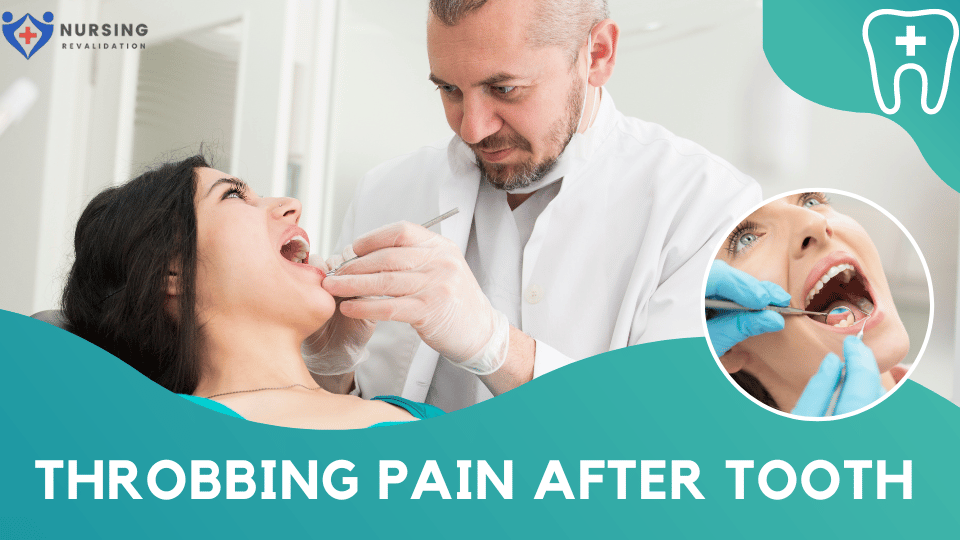Have you ever experienced throbbing pain after a toothache? It can be a debilitating sensation that interferes with your daily activities and can even affect your sleep. Toothaches can occur due to various reasons, and the pain can be sharp, constant, or throbbing. In this article, we will explore the causes, symptoms, and treatment options for throbbing pain after a tooth.
Understanding Throbbing Pain After Tooth
A throbbing pain after a tooth can be a result of various dental issues. The pain is usually a result of inflammation in the tooth’s pulp or nerve, which can cause a pulsating sensation. The pain can vary from mild to severe and can affect one or multiple teeth.
Causes of Throbbing Pain After Tooth
Here are some common causes of throbbing pain after tooth:
– Tooth decay
Tooth decay is the primary cause of toothaches. When the bacteria in your mouth produce acid that eats away your tooth’s enamel, it leads to cavities. The cavities can cause inflammation in the tooth pulp, leading to a throbbing pain sensation.
– Tooth fracture
A tooth fracture can cause pain and sensitivity in the tooth. The pain can be constant or throbbing, depending on the severity of the fracture. In severe cases, the tooth may require root canal therapy or extraction.
– Gum disease
Gum disease, also known as periodontal disease, is caused by the buildup of bacteria in the gum tissue. It can cause swelling, redness, and bleeding in the gums, leading to toothache and throbbing pain.
– Sinus infection
A sinus infection can cause pain in the upper teeth due to the proximity of the sinus cavities to the roots of the upper teeth. The pain can be throbbing and can worsen when you bend forward.
– Temporomandibular Joint Disorder (TMJ)
TMJ is a condition that affects the joint connecting the jawbone to the skull. It can cause pain, tenderness, and throbbing pain in the jaw and teeth.
– Bruxism
Bruxism is a condition where you clench or grind your teeth, leading to tooth damage and pain. It can cause a dull, constant pain or a throbbing sensation.
Symptoms of Throbbing Pain After Tooth
Apart from the throbbing pain, here are some common symptoms of toothaches:
– Pain
The pain can be mild, severe, constant, or throbbing. It can be a result of various dental issues, as mentioned above.
– Swelling
Swelling in the gums or face can occur due to infection or inflammation in the tooth or gum tissue.
– Sensitivity
Tooth sensitivity can occur due to the exposure of the tooth’s nerve or pulp, leading to pain or discomfort when you eat or drink something
– Headache
Toothaches can cause headaches, especially if the pain is severe and radiates to the head and neck area.
Treatment Options for Throbbing Pain After Tooth
Here are some common treatment options for throbbing pain after tooth:
– Over-the-counter pain medication
Over-the-counter pain relievers such as ibuprofen or acetaminophen can help alleviate mild to moderate toothache pain.
– Antibiotics
If the toothache is caused by a bacterial infection, your dentist may prescribe antibiotics to eliminate the infection.
– Root canal therapy
Root canal therapy is a dental procedure that involves removing the infected pulp from the tooth and filling it with a dental filling. It can help save the tooth and alleviate the throbbing pain.
– Tooth extraction
If the tooth is severely damaged and cannot be saved with root canal therapy, your dentist may recommend extracting the tooth.
– Cold compress
Applying a cold compress to the affected area can help reduce swelling and alleviate the pain.
– Saltwater rinse
Rinsing your mouth with warm saltwater can help reduce inflammation and alleviate pain.
Prevention Tips for Throbbing Pain After Tooth
Here are some tips to prevent toothaches and throbbing pain:
- Brush your teeth twice a day with a fluoride toothpaste
- Floss daily to remove plaque and food particles
- Use an antiseptic mouthwash to kill bacteria
- Limit sugary and acidic foods and drinks
- Wear a mouthguard if you grind your teeth
- Visit your dentist regularly for check-ups and cleanings
6. Conclusion
Throbbing pain after tooth can be a result of various dental issues, including tooth decay, gum disease, and tooth fracture. The pain can be mild to severe and can affect one or multiple teeth. Treatment options include over-the-counter pain medication, antibiotics, root canal therapy, tooth extraction, cold compress, and saltwater rinse. Prevention tips include maintaining good oral hygiene, limiting sugary and acidic foods and drinks, and wearing a mouthguard if you grind your teeth.
FAQs
How long does a toothache last?
A toothache can last from a few hours to a few days, depending on the cause of the pain. If the pain persists for more than a few days, you should see your dentist.
Can a sinus infection cause tooth pain?
Yes, a sinus infection can cause pain in the upper teeth due to the proximity of the sinus cavities to the roots of the upper teeth.
How can I relieve toothache pain at home?
You can try applying a cold compress to the affected area, rinsing your mouth with warm saltwater, and taking over-the-counter pain medication.
Is it necessary to extract a tooth if it's causing throbbing pain?
Not always. Your dentist will recommend the best treatment option based on the cause and severity of the pain.
Can toothaches be prevented?
Yes, maintaining good oral hygiene, limiting sugary and acidic foods and drinks, and visiting your dentist regularly for check-ups and cleanings can help prevent toothaches.

